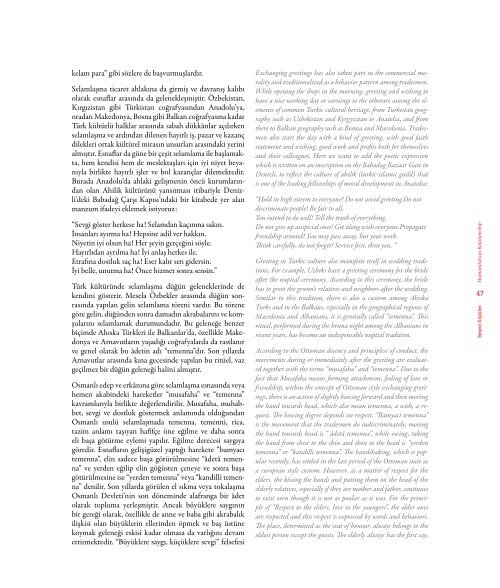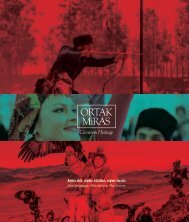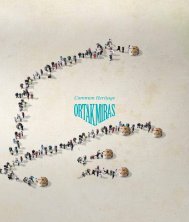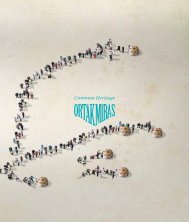You also want an ePaper? Increase the reach of your titles
YUMPU automatically turns print PDFs into web optimized ePapers that Google loves.
kelam para” gibi sözlere de başvurmuşlardır.<br />
Selamlaşma ticaret ahlakına da girmiş ve davranış kalıbı<br />
olarak esnaflar arasında da gelenekleşmiştir. Özbekistan,<br />
Kırgızistan gibi Türkistan coğrafyasından Anadolu’ya,<br />
oradan Makedonya, Bosna gibi Balkan coğrafyasına kadar<br />
Türk kültürlü halklar arasında sabah dükkânlar açılırken<br />
selamlaşma ve ardından dilenen hayırlı iş, pazar ve kazanç<br />
dilekleri <strong>ortak</strong> kültürel <strong>miras</strong>ın unsurları arasındaki yerini<br />
almıştır. Esnaflar da güne bir çeşit selamlama ile başlamakta,<br />
hem kendisi hem de meslektaşları için iyi niyet beyanıyla<br />
birlikte hayırlı işler ve bol kazançlar dilemektedir.<br />
Burada Anadolu’da ahlaki gelişmenin öncü kurumlarından<br />
olan Ahilik kültürünü yansıtması itibariyle Denizli’deki<br />
Babadağ Çarşı Kapısı’ndaki bir kitabede yer alan<br />
manzum ifadeyi eklemek istiyoruz:<br />
“Sevgi göster herkese ha! Selamdan kaçınma sakın.<br />
İnsanları ayırma ha! Hepsine adil ver hakkın.<br />
Niyetin iyi olsun ha! Her şeyin gerçeğini söyle.<br />
Hayırlıdan ayrılma ha! İyi anlaş herkes ile.<br />
Etrafına dostluk saç ha! Eser kalır sen gidersin.<br />
İyi belle, unutma ha! Önce hizmet sonra sensin.”<br />
Türk kültüründe selamlaşma düğün geleneklerinde de<br />
kendini gösterir. Mesela Özbekler arasında düğün sonrasında<br />
yapılan gelin selamlama töreni vardır. Bu törene<br />
göre gelin, düğünden sonra damadın akrabalarını ve komşularını<br />
selamlamak durumundadır. Bu geleneğe benzer<br />
biçimde Ahıska Türkleri ile Balkanlar’da, özellikle Makedonya<br />
ve Arnavutların yaşadığı coğrafyalarda da rastlanır<br />
ve genel olarak bu âdetin adı “temenna”dır. Son yıllarda<br />
Arnavutlar arasında kına gecesinde yapılan bu ritüel, vaz<br />
geçilmez bir düğün geleneği halini almıştır.<br />
Osmanlı edep ve erkânına göre selamlaşma esnasında veya<br />
hemen akabindeki hareketler “musafaha” ve “temenna”<br />
kavramlarıyla birlikte değerlendirilir. Musafaha, muhabbet,<br />
sevgi ve dostluk göstermek anlamında olduğundan<br />
Osmanlı usulü selamlaşmada temenna, temenni, rica,<br />
tazim anlamı taşıyan hafifçe öne eğilme ve daha sonra<br />
eli başa götürme eylemi yapılır. Eğilme derecesi saygıya<br />
göredir. Esnafların gelişigüzel yaptığı harekete “bamyacı<br />
temenna”, elin sadece başa götürülmesine “âdetâ temenna”<br />
ve yerden eğilip elin göğüsten çeneye ve sonra başa<br />
götürülmesine ise “yerden temenna” veya “kandilli temenna”<br />
denilir. Son yıllarda görülen el sıkma veya tokalaşma<br />
Osmanlı Devleti’nin son döneminde alafranga bir âdet<br />
olarak topluma yerleşmiştir. Ancak büyüklere saygının<br />
bir gereği olarak, özellikle de anne ve baba gibi akrabalık<br />
ilişkisi olan büyüklerin ellerinden öpmek ve baş üstüne<br />
koymak geleneği eskisi kadar olmasa da varlığını devam<br />
ettirmektedir. “Büyüklere saygı, küçüklere sevgi” felsefesi<br />
Exchanging greetings has also taken part in the commercial morality<br />
and traditionalized as a behavior pattern among tradesmen.<br />
While opening the shops in the morning, greeting and wishing to<br />
have a nice working day or earnings to the otherare among the elements<br />
of common Turkic cultural heritage, from Turkestan geography<br />
such as Uzbekistan and Kyrgyzstan to Anatolia, and from<br />
there to Balkan geography such as Bosnia and Macedonia. Tradesmen<br />
also start the day with a kind of greeting, with good faith<br />
statement and wishing, good work and profits both for themselves<br />
and their colleagues. Here we want to add the poetic expression<br />
which is written on an inscription on the Babadag Bazaar Gate in<br />
Denizli, to reflect the culture of ahilik (turkic-islamic guild) that<br />
is one of the leading fellowships of moral development in Anatolia:<br />
“Hold in high esteem to everyone! Do not avoid greeting.Do not<br />
discriminate people! Be fair to all.<br />
You intend to do well! Tell the truth of everything.<br />
Do not give up auspicial ones! Get along with everyone.Propagate<br />
friendship around! You may pass away, but your work.<br />
Think carefully, do not forget! Service first, then you. “<br />
Greeting in Turkic culture also manifests itself in wedding traditions.<br />
For example, Uzbeks have a greeting ceremony for the bride<br />
after the nuptial ceremony. According to this ceremony, the bride<br />
has to greet the groom’s relatives and neighbors after the wedding.<br />
Similar to this tradition, there is also a custom among Ahiska<br />
Turks and in the Balkans, especially in the geographical regions of<br />
Macedonia and Albanians, it is generally called “temenna”. This<br />
ritual, performed during the henna night among the Albanians in<br />
recent years, has become an indispensable nuptial tradition.<br />
According to the Ottoman decency and principless of conduct, the<br />
movements during or immediately after the greeting are evaluated<br />
together with the terms “musafaha” and “temenna”. Due to the<br />
fact that Musafaha means forming attachment, feeling of love or<br />
friendship, within the concept of Ottoman style exchanging greetings,<br />
there is an action of slightly bowing forward and then moving<br />
the hand towards head, which also mean temenna, a wish, a request.<br />
The bowing degree depends on respect. “Bamyaci temenna”<br />
is the movement that the tradesmen do indiscriminately, moving<br />
the hand towards head is “ âdetâ temenna”, while owing, taking<br />
the hand from chest to the chin and then to the head is “yerden<br />
temenna” or “kandilli temenna”. The handshaking, which is popular<br />
recently, has settled in the last period of the Ottoman state as<br />
a european style custom. However, as a matter of respect for the<br />
elders, the kissing the hands and putting them on the head of the<br />
elderly relatives, especially if they are mother and father, continues<br />
to exist even though it is not as poular as it was. For the principle<br />
of “Respect to the elders, love to the youngers”, the older ones<br />
are respected and this respect is expressed by words and behaviors.<br />
The place, determined as the seat of honour, always belongs to the<br />
oldest person except the guests. The elderly always has the first say.<br />
Humanitarian Relationship<br />
47<br />
Beşeri İlişkiler
















